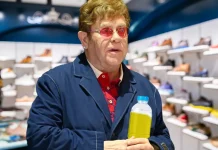Drugs, unfortunately, have been a dark undercurrent in the music industry for ages. However, amidst the tragic stories of those lost to addiction, there are Musicians Who Overcame Addiction, defied the headlines, and continue to grace stages with their music.
The rock and roll lifestyle often conjures images of excess, rebellion, and a dangerous flirtation with self-destruction.
Here are 13 musicians who stared down the abyss of addiction and emerged stronger on the other side, proving that rock and roll isn’t just about living fast – it’s about resilience and the enduring power of music.
Steven Tyler (Aerosmith)

The frontman of Aerosmith needs no introduction. His wild past with heroin and cocaine is no secret. In the 1970s, Aerosmith’s future hung by a thread as both Tyler and his bandmate Joe Perry battled addiction.
Thankfully, Tyler entered rehab in the 80s, cleaned up his act, and has remained sober for decades, leading Aerosmith to become one of the best-selling rock bands of all time.
Elton John

Sir Elton John’s career is a testament to overcoming personal struggles. Cocaine and alcohol threatened to derail his career in the 70s.
However, he entered rehab in the early 80s and has been vocal about his recovery journey. Today, he remains a musical icon and a tireless advocate for addiction recovery.
Ozzy Osbourne

The “Prince of Darkness” has a reputation for pushing boundaries, not just musically. His battles with drug and alcohol abuse are well-documented.
However, Ozzy, defying all odds, has managed to stay relatively healthy and continues to tour and record music in his 70s. Maybe there is some truth to that “bat bite” story after all?
Slash (Guns N’ Roses)

Slash’s iconic top hat and mirrored sunglasses were often a front for a man battling addiction issues. His years with Guns N’ Roses were fueled by heavy drug and alcohol use.
However, after a near-death experience and a band break-up, Slash entered rehab and cleaned up his act. He continues to make music, both as a solo artist and with Guns N’ Roses reunions.
Robert Downey Jr.

While not strictly a musician, Downey Jr.’s story is a powerful example of overcoming addiction. His early career was plagued by drug use, leading to numerous arrests and career setbacks.
However, Downey Jr. found his way to rehab in the early 2000s and has remained sober ever since. His remarkable comeback has seen him become one of Hollywood’s highest-paid actors and a beacon of hope in recovery circles.
Eminem

The controversial rapper’s lyrics often dealt with his struggles with addiction, particularly prescription drugs. In 2007, he publicly revealed his battle with addiction and entered rehab.
Eminem has remained sober since, channeling his experiences into powerful and introspective music, reminding us that even anger can be turned into something positive.
Steven Van Zandt (The E Street Band)

Bruce Springsteen’s right-hand man, Van Zandt, battled heroin addiction in the late 70s. His struggles mirrored those of Bruce Springsteen himself, who wrote the song “The River” partly
inspired by Van Zandt’s experiences. Thankfully, Van Zandt sought help and has been sober ever since, remaining a vital part of Springsteen’s band.
John Frusciante (Red Hot Chili Peppers)

Red Hot Chili Peppers guitarist John Frusciante is a musical prodigy haunted by demons. He battled heroin addiction for years, leaving the band twice during his struggles.
Thankfully, with dedication and support, Frusciante found his way back to music, clean and sober. His return to the Red Hot Chili Peppers reinvigorated the band and produced some of their most acclaimed albums.
Corey Taylor (Slipknot & Stone Sour)

Slipknot and Stone Sour frontman Corey Taylor’s story is one of near misses. He battled addiction in his teens and young adulthood, even experiencing a near-death overdose.
However, Taylor found the strength to get clean, channeling his experiences into his music, creating a powerful connection with fans who may be facing similar struggles.
Nikki Sixx (Mötley Crüe)

The bassist of Mötley Crüe epitomized the rock and roll bad boy image. His heroin addiction was so severe that he was pronounced legally dead for several minutes after an overdose. However, Nikki Sixx defied the odds, entered rehab, and remains sober to this day.
He continues to make music with Mötley Crüe and has even authored books about his struggles with addiction. His story is a testament to the enduring power of second chances.
Stevie Nicks (Fleetwood Mac)

The ethereal voice of Fleetwood Mac battled cocaine addiction in the 70s and 80s. Her struggles threatened to derail her career and her health.
However, Nicks found the strength to overcome her addiction and remains a captivating performer with a devoted fanbase.
Rod Stewart

The raspy-voiced rocker has admitted to past struggles with alcohol and cocaine. However, in the early 90s, he committed to a healthier lifestyle, and it shows.
Stewart continues to tour and record music in his 70s, proving that rock and roll can be enjoyed well beyond one’s youth.
Keith Richards (The Rolling Stones)

The legendary guitarist of The Rolling Stones has built a reputation for defying expectations, both musically and personally. His past with drugs and alcohol is well-documented.
However, Richards, fueled by a seemingly superhuman constitution, continues to tour and record with The Stones in his 70s. Perhaps there’s something to the “rock and roll doesn’t die” mantra after all.
These musicians remind us that addiction doesn’t discriminate. It can affect anyone, regardless of talent, fame, or fortune. But their stories also offer a glimmer of hope.
Overcoming addiction is a battle, but it’s a battle that can be won. With dedication, support, and a genuine desire to change, even the darkest situations can have a brighter tomorrow.
These artists haven’t just defied the odds and cheated death; they’ve defied the stereotypes associated with the rock and roll lifestyle. They’ve proven that rock and roll can be a force for good, a testament to resilience, and a reminder that the best music is often born from overcoming personal struggles.
So the next time you hear a song that speaks to your soul, take a moment to appreciate not just the music, but the story of the artist behind it, a story that might not always be glamorous but is undoubtedly inspiring.











